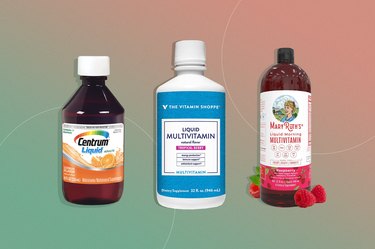
Growing up, you may have heard your mom or grandmother warn you that going outside with wet hair would make you sick, especially in cold weather.
But is this really true?
Video of the Day
Video of the Day
While illnesses typically increase in the winter, there is no connection between wet hair and your chances of getting sick. (And for the record, no, cold weather itself doesn't make you sick either.)
Here, Kien Vuu, MD, a California-based longevity physician, debunks this myth and explains the real reasons you get sick in the winter, plus tips for how to stay healthy and warm.
Warning
Visit your doctor if you have a fever, chills, nausea, vomiting or other symptoms of illness.
Does Wet Hair Make You Sick?
The short answer: No. Going outside with wet hair when it's cold may make you feel uncomfortable, but it will not increase your chances of catching a virus, Dr. Vuu says. (Remember that both cold and flu are caused by viruses.)
The germs that cause viruses and infections are spread through the air, on hard surfaces and through bodily fluids, like blood, mucus or water droplets expelled when you sneeze or cough, per the Centers for Disease Control and Prevention (CDC).
These germs enter your body through your nose and mouth — when you touch your face, inhale air with germs or come into close contact with someone who's sick — not through your hair.
That means if you happen to feel sick after going outside with wet hair, you probably had already contracted a virus and being in the cold air made you start to notice symptoms of being sick, like runny nose, sore throat and body aches.
Why Do People Believe the 'Going Outside With Wet Hair' Myth?
Some people think going out with wet hair in the cold will make you sick because illness is more common in the winter. "But there is no direct link between the two," Dr. Vuu says.
Colder temperatures just happen to be better environments for viruses, like the rhinovirus (aka the common cold), to travel through the air and linger in your nose and mouth, according to the Cleveland Clinic.
When it's cold outside, people also tend to gather indoors where there's less natural ventilation. The combination of close contact, central heating running all day and indoor air creates a breeding ground for germs, Dr. Vuu says.
Why? Sitting or standing close to other people can expose you to water droplets they expel through coughing or sneezing, and dry indoor air can keep those germs around longer. Artificial heat can also dry out the mucus in your nasal passageways, which is needed to trap germs and fight illness, according to a February 2017 review in Cell Host & Microbe.
Dr. Vuu also says the more often you're indoors, the less sunlight you get. And sunlight is a main source of vitamin D that's critical for immune support — another reason you get sick more often in winter.
Ultimately, wet hair is more about "the feeling of discomfort than the risk of getting sick," Dr. Vuu says. You are likely getting sick from other factors.
Is It Bad to Sleep With Wet Hair?
Going outside with wet hair will not make you sick, but there's a chance that bacteria and fungus will spread if you sleep on wet hair, according to the Cleveland Clinic.
Wet hair traps moisture and is kept wet by the fabric of your pillow. This damp environment can then become filled with germs and bacteria, which can lead to dandruff and scalp infections and even cause you to inhale germs that could make you sick, Dr. Vuu says.
Additionally, wet hair is heavier and can lead to hair breakage and damage. That's why Dr. Vuu recommends drying your hair prior to sleeping, or using hair products that help strengthen hair, like vitamin E oils or serum.
4 Tips for Going Outside if You're Already Sick
If you are already sick and need to brave the cold to get to work or school, there are some things you can do to feel more comfortable and prevent your symptoms from getting worse.
1. Bundle Up
Whether you have wet or dry hair, wearing as many warm layers as possible will help trap body heat and keep you from feeling sicker, according to Beth Israel Lahey Health.
You may want to invest in a warm puffer jacket, for example, or some cold-weather running gear.
2. Cover Your Nose and Mouth
Not only will covering your nose and mouth with a scarf or mask keep you warm, it will also protect you and others from spreading and catching more germs, according to Northwestern Medicine.
3. Dry Your Hair or Wear It Up
The optimal choice is to dry your hair before going outside, Dr. Vuu says. This will help you feel comfortable and stay warm.
But if you're pressed for time, tying up your hair or tucking it into a hat will do wonders for your warmth and sniffles.
4. Try an Antihistamine
If you deal with environmental allergies, your symptoms may get worse when you go outside in the cold, or when you're already sick.
That's why it may help to use a nasal spray, decongestant or over-the-counter antihistamine prior to heading outdoors.
How to Stay Healthy in the Winter
Even though going outside with wet hair in the winter will not make you sick, there are other precautions you can take to stay as healthy as possible this time of year.
1. Use a Humidifier
When you have the heat on in your home, the air can get dry, causing germs to stick around in the air and in your nasal passageways, per University Hospitals. That's why adding moisture to your environment is important.
Try using a humidifier to keep the air moist and your mucus at healthy levels.
2. Use Artificial Sun Lamps
"Seasonal affective disorder and lack of sunlight exposure is another reason why people feel under the weather in the winter, besides viruses or infections," Dr. Vuu says. This can also lower your levels of immunity, he adds.
Artificial sun lamps mimic natural sunlight to help regulate your mood, your circadian rhythm and your melatonin and serotonin cycles, according to the Cleveland Clinic.
3. Drink Plenty of Water
When outdoor temperatures drop, your feelings of thirst may drop, too. But that doesn't mean you need less water.
We still lose water through sweat, urine and breath in cold weather. Proper hydration is also needed to generate enough heat to regulate your body temperature, according to Penn State University's College of Agricultural Sciences.
Aim for 11.5 to 15.5 cups through eating water-rich foods and drinking fluids, according to the Mayo Clinic.
4. Get Enough Sleep
A September 2015 study in Sleep found that shorter sleep times were associated with increased susceptibility to the common cold.
Aim for between seven and nine hours of shut-eye per night, according to the CDC.
5. Take Vitamin D (or a Multivitamin)
Many people do not get enough vitamin D from food and sunlight alone, especially during the winter months when the sun isn't out as often.
Taking a vitamin D supplement (about 600 IU) can help control infections and reduce inflammation, per the Harvard T.H. Chan School of Public Health. Multivitamins with vitamins A, B, C, E and K can also provide essential nutrients to keep you healthy.
It is possible to overdo it, though. Vitamin D is a fat-soluble vitamin, which means it can build up in the body and cause problems if your levels get too high. That's why it's best to check with your doctor before starting any supplement — they may want to check your vitamin levels with a blood test first to determine how much you really need.
The Bottom Line
Going outside with wet hair when it's cold will not make you sick. (Sorry, Grandma.)
It also won't attract germs or make you more susceptible to viruses and infections. If anything, you'll just feel uncomfortable, especially if you're already sick.
- Dr. Kien Vuu: "Bio"
- CDC: "How Infections Spread"
- Cell Host & Microbe: "The interaction between respiratory pathogens and mucus"
- Beth Israel Lahey Health Winchester Hospital: "Running Through the Cold"
- Northwestern Medicine: "Can Winter Make You Sick? Cold Temperatures Linked to Virus Transmission"
- Penn State Extension: "Hydration in Cold Weather"
- Mayo Clinic: "Tips for Drinking More Water"
- Sleep: "Behaviorally Assessed Sleep and Susceptibility to the Common Cold"
- CDC: "How Much Sleep Do I Need?"
- Harvard T.H. Chan School of Public Health: "Vitamin D"
- University Hospitals: "The Role of Dry Winter Air in Spreading COVID-19"
- Cleveland Clinic: "Will a SAD Sun Lamp Actually Make You Happy?"
Is this an emergency? If you are experiencing serious medical symptoms, please see the National Library of Medicine’s list of signs you need emergency medical attention or call 911.



